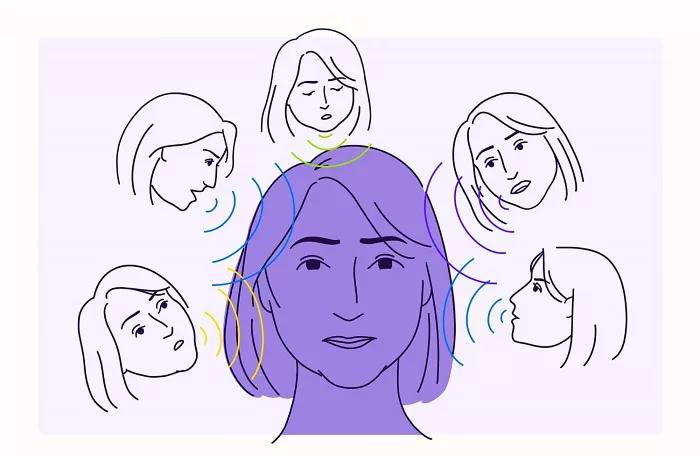Schizophrenia is a complex mental health condition that affects how a person thinks, feels, and behaves. It is often misunderstood, and many people wonder how someone develops this disorder. While the exact cause of schizophrenia is still not fully understood, research suggests that it results from a combination of genetic, biological, and environmental factors. In this article, we will explore these factors in detail to help you better understand how schizophrenia develops.
What Is Schizophrenia
Schizophrenia is a chronic brain disorder that affects less than 1% of the population. People with schizophrenia may experience hallucinations, delusions, disorganized thinking, and difficulty functioning in daily life. These symptoms can be distressing and often require long-term treatment. The disorder typically appears in late adolescence or early adulthood, but it can develop at any age.
Genetic Factors in Schizophrenia Development
Family History and Genetics
One of the strongest risk factors for schizophrenia is genetics. If someone in your family has schizophrenia, your risk of developing the disorder increases. Studies show that the risk is highest for identical twins. If one twin has schizophrenia, the other twin has a 40-50% chance of developing it. For siblings or parents, the risk is lower but still higher than in the general population.
Specific Genes
Researchers have identified several genes that may contribute to schizophrenia. These genes are involved in brain development, neurotransmitter regulation, and immune system function. However, no single gene causes schizophrenia. Instead, it is likely that multiple genes interact to increase the risk.
Brain Structure and Function
Abnormal Brain Development
People with schizophrenia often have differences in brain structure and function. For example, some areas of the brain may be smaller or less active. These differences can affect how the brain processes information and may contribute to symptoms like hallucinations and delusions.
Neurotransmitter Imbalance
Neurotransmitters are chemicals in the brain that help nerve cells communicate. In schizophrenia, there is often an imbalance of neurotransmitters like dopamine and glutamate. Too much dopamine in certain areas of the brain is linked to hallucinations and delusions. Too little glutamate may affect thinking and memory.
Environmental Factors
Prenatal and Birth Complications
Environmental factors during pregnancy and birth can increase the risk of schizophrenia. For example, infections during pregnancy, malnutrition, or complications during delivery may affect brain development. Babies born with a low birth weight or who experience oxygen deprivation are also at higher risk.
Childhood Trauma
Traumatic experiences in childhood, such as abuse, neglect, or the loss of a parent, can increase the risk of developing schizophrenia later in life. Trauma can affect brain development and stress responses, making the brain more vulnerable to mental health disorders.
Substance Use
Using drugs, especially during adolescence, can increase the risk of schizophrenia. Marijuana, LSD, and amphetamines have been linked to the onset of the disorder. These substances can alter brain chemistry and trigger symptoms in people who are already at risk.
Psychological and Social Factors
Stressful Life Events
Stressful life events, such as the death of a loved one, a breakup, or financial problems, can trigger schizophrenia in people who are genetically predisposed. Stress can affect the brain and make symptoms worse.
Social Isolation
People who are socially isolated or have few close relationships may be at higher risk for schizophrenia. Lack of social support can increase stress and make it harder to cope with symptoms.
The Interaction of Factors
Schizophrenia is not caused by a single factor. Instead, it results from the interaction of genetic, biological, and environmental factors. For example, someone with a genetic predisposition may not develop schizophrenia unless they are exposed to certain environmental triggers, like stress or drug use. This is known as the “stress-vulnerability model.”
Early Signs and Symptoms
Prodromal Phase
Before full-blown schizophrenia develops, many people experience a prodromal phase. This phase can last for months or even years. Symptoms during this phase may include social withdrawal, difficulty concentrating, and mild hallucinations or delusions.
First Episode
The first episode of schizophrenia usually occurs in late adolescence or early adulthood. Symptoms may appear suddenly or develop gradually. Common symptoms include hallucinations (hearing voices), delusions (false beliefs), and disorganized thinking.
Diagnosis and Treatment
Diagnosis
Diagnosing schizophrenia can be challenging because its symptoms overlap with other mental health conditions. A psychiatrist will typically conduct a thorough evaluation, including a medical history, physical exam, and psychological tests.
Treatment
While there is no cure for schizophrenia, treatment can help manage symptoms. Treatment usually includes a combination of medication, therapy, and support services. Antipsychotic medications are the most common treatment. They help reduce hallucinations, delusions, and disorganized thinking. Therapy, such as cognitive-behavioral therapy (CBT), can help people manage symptoms and improve functioning.
Living with Schizophrenia
Support Systems
Having a strong support system is crucial for people with schizophrenia. Family, friends, and support groups can provide emotional support and help with daily tasks.
Self-Care
Self-care is also important. This includes taking medication as prescribed, attending therapy sessions, and maintaining a healthy lifestyle. Regular exercise, a balanced diet, and good sleep hygiene can help improve overall well-being.
Conclusion
Schizophrenia is a complex disorder that develops due to a combination of genetic, biological, and environmental factors. While the exact cause is still unknown, research has provided valuable insights into how these factors interact. Understanding the development of schizophrenia can help reduce stigma and improve treatment options. If you or someone you know is experiencing symptoms of schizophrenia, it is important to seek help from a mental health professional. With the right treatment and support, people with schizophrenia can lead fulfilling lives.
Related topics:
- What Happens In The Brain With Schizophrenia?
- Does Nina Have Schizophrenia In Black Swan?
- Is Paranoid Schizophrenia A Personality Disorder?


